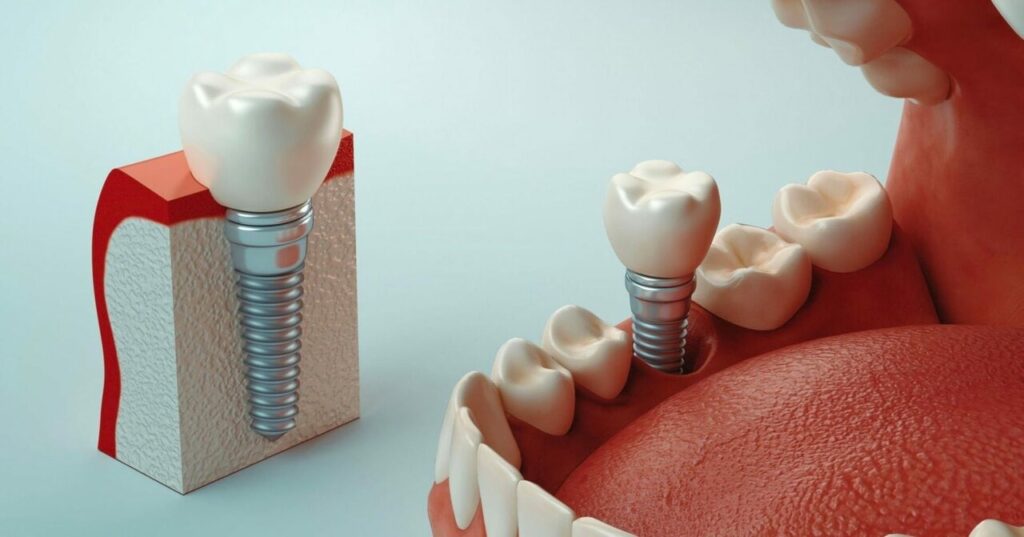
Tooth loss is more common than most people think, and restoring missing teeth is essential not just for your smile, but also for your ability to chew, speak, and maintain proper oral health. When it comes to tooth replacement, two of the most popular options are dental implants and partial dentures. But the question is: what’s better—dental implant or partial denture?
While both solutions serve the purpose of replacing missing teeth, they differ significantly in terms of cost, comfort, longevity, appearance, and maintenance. Choosing the right option depends on your personal needs, budget, oral health condition, and long-term goals.
In this article, we’ll compare dental implants and partial dentures in detail to help you make an informed decision.
What Are Dental Implants?
Overview of Dental Implants
A dental implant is a surgically placed titanium post that acts as an artificial tooth root. A crown is then attached to replace the missing tooth.
Components of a Dental Implant
- Implant post (inserted into the jawbone)
- Abutment (connector piece)
- Dental crown (visible part)
Key Benefits of Implants
- Permanent and stable solution
- Prevents bone loss
- Feels and functions like a real tooth
- No impact on adjacent teeth
What Are Partial Dentures?
Overview of Partial Dentures
A partial denture is a removable appliance that replaces one or more missing teeth. It typically consists of a metal or acrylic framework with false teeth attached.
Types of Partial Dentures
- Acrylic partial dentures (budget-friendly, less durable)
- Cast metal partial dentures (stronger and more secure)
- Flexible partial dentures (made from soft, gum-colored material)
Key Benefits of Partial Dentures
- More affordable initially
- Non-invasive (no surgery required)
- Easy to adjust or repair
- Suitable for replacing multiple missing teeth
Comparing Dental Implants vs. Partial Dentures
1. Durability and Longevity
Dental Implants
- Last 15–25 years or more
- Require minimal maintenance
- Highly durable with proper care
Partial Dentures
- Last 5–10 years
- May need adjustments over time
- Susceptible to breakage or wear
Winner: Dental Implants for long-term reliability
2. Comfort and Functionality
Dental Implants
- Feels like a natural tooth
- No movement or clicking sounds
- Allows normal chewing and speaking
Partial Dentures
- May feel bulky at first
- Can shift while eating or speaking
- May require adhesive for stability
Winner: Dental Implants for superior comfort and function
3. Appearance and Aesthetics
Dental Implants
- Custom-made to match natural teeth
- Blend seamlessly into your smile
Partial Dentures
- Can look natural but may have visible clasps
- Aesthetic quality depends on materials used
Winner: Dental Implants for natural, seamless appearance
4. Bone Health and Oral Structure
Dental Implants
- Stimulate jawbone, preventing bone loss
- Maintain facial structure and jaw alignment
Partial Dentures
- Do not stimulate the bone
- Long-term use may lead to bone resorption
Winner: Dental Implants for promoting bone health
5. Cost and Affordability
Dental Implants
- Initial cost: £2,000–£2,500 per tooth in the UK
- Higher upfront investment
- Long-term value due to durability
Partial Dentures
- Cost: £300–£700 (depending on material)
- More affordable upfront
- May require replacements or relining
Winner: Partial Dentures for short-term affordability
Dental Implants for long-term value
6. Surgical Procedure and Healing Time
Dental Implants
- Requires surgery and healing time (3–6 months)
- Involves osseointegration with the jawbone
Partial Dentures
- Non-surgical and quicker process
- Usually ready within weeks
Winner: Partial Dentures for those wanting a faster, non-invasive solution
Ideal Candidates for Each Option
Dental Implants Are Best For:
- Healthy individuals with good bone density
- Patients looking for a permanent solution
- Those who can undergo minor oral surgery
Partial Dentures Are Best For:
- People on a tight budget
- Individuals with health conditions that prevent surgery
- Those needing a temporary or flexible solution
FAQs: Dental Implants vs. Partial Dentures
Q1: Which is more expensive—dental implants or partial dentures?
Dental implants are more expensive initially, but they offer better long-term value due to their durability and functionality.
Q2: Do partial dentures damage adjacent teeth?
In some cases, metal clasps can put pressure on surrounding teeth, leading to wear or damage over time.
Q3: Can I eat normally with both options?
Implants offer nearly full chewing ability, while dentures may limit certain foods due to movement or discomfort.
Q4: Are implants safe?
Yes, dental implants are safe and biocompatible, with a success rate of over 95% when performed by a qualified professional.
Q5: What if I’m missing multiple teeth?
Both implants and partial dentures can replace multiple teeth. However, implant-supported bridges may be recommended if you want a fixed option.
Conclusion
So, what’s better—dental implants or partial dentures? The answer depends on your budget, health, long-term goals, and lifestyle.
- Choose dental implants if you want a permanent, natural-looking, and highly functional solution with long-term benefits.
- Opt for partial dentures if you’re looking for a more affordable, non-surgical option or a temporary fix.
Both options have their place in modern dentistry, and a consultation with your dentist can help determine which solution is right for you.

